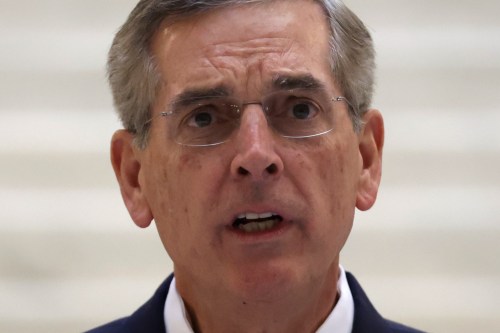Turn any article into a podcast. Upgrade now to start listening.
Premium Members can share articles with friends & family to bypass the paywall.
We’re actively working on improvements to better serve our community, and we want to hear directly from our readers about their experience with our content. Will you take 5-10 minutes to share your thoughts in a quick survey? Your responses will help us continue to improve your Dispatch experience.
We’re actively working on improvements to better serve our community, and we want to hear directly from our members about their experience with our content. Will you take 5-10 minutes to share your thoughts in a quick survey? Your responses will help us continue to improve your Dispatch experience.
Happy Friday! We hope readers have a wonderful weekend, but before you wrap up the week, consider tuning into today’s 10 a.m. EST YouTube livestream of the 2025 Federal Duck Stamp Contest by the U.S. Fish and Wildlife Service. Nearly 300 illustrations are in the running, and shall be graded by a “panel of five noted art, waterfowl and stamp authorities judges.” May the best bird win!
Quick Hits: Today’s Top Stories
- Chip manufacturer Nvidia announced Thursday that it would invest $5 billion in Intel, its struggling rival company, facilitating a partnership in custom data centers and personal computer products. Intel shares rose almost 25 percent on the news, while Nvidia’s stock prices increased by more than 3 percent. Intel, which the U.S. government recently bought a 10 percent stake in, has been struggling in the AI era and plans to lay off almost a quarter of its workforce this year. By contrast, Nvidia has been the biggest beneficiary of the AI boom—with its stock rising more than 1,200 percent over the past five years—and is also close with the Trump administration, cutting a deal in August to once again sell advanced AI chips to China in exchange for 15 percent of Chinese sales revenue going to the U.S. government.
- The Senate voted 51-47 Thursday to confirm 48 of President Donald Trump’s nominees in a single ballot, the first batch approved under new rules that allow bloc confirmations with simple majority votes. Senate Republicans triggered the “nuclear option” last week to change chamber procedures after accusing Democrats of unprecedented obstruction of lower-level executive branch picks. Among those confirmed were former Fox News personality Kimberly Guilfoyle as ambassador to Greece and Callista Gingrich as ambassador to Switzerland and Liechtenstein, along with deputy secretaries across multiple departments. Senate Majority Leader John Thune said the rule change was necessary to prevent hundreds of empty desks remaining unfilled through 2029, but Senate Democratic Leader Chuck Schumer warned that Republicans would “come to regret” the precedent.
- Israel and Israeli troops faced multiple attacks on Thursday. A Jordanian terrorist killed two soldiers near Allenby Crossing between the West Bank and Jordan while driving a Gaza-bound aid truck; a Houthi drone struck a hotel entrance in the southern Israeli city of Eilat, causing property damage but no casualties, while Israel intercepted two additionally Houthi drones and a ballistic missile; and four Israeli troops were killed (and three others injured) in a roadside bomb attack in Rafah. The Rafah attack brought the Israeli death toll of the Gaza ground offensive to 469 soldiers. Meanwhile, Israel continues its ground operation into Gaza City, and estimates that 480,000 residents have evacuated so far. In response to the truck attack, Prime Minister Benjamin Netanyahu says Israel will increase its aid truck inspections at Jordan’s borders and, on Thursday evening, the Israel Defense Forces recommended temporarily halting the transport of aid through the Allenby Crossing.
- During a Thursday press conference with British Prime Minister Keir Starmer, Trump announced a multi-billion-dollar tech deal to advance AI innovation, nuclear energy, and research on quantum technologies. Google, OpenAI, Nvidia, and Microsoft are among the several companies that announced investments under this initiative, dubbed the “Technology Prosperity Deal.” Meanwhile, Trump again urged European nations to stop purchasing Russian oil, which he said helps President Vladimir Putin fund the war in Ukraine, and noted that the U.K.’s recent announcement that it will recognize Palestinian statehood was “one of our few disagreements” in the Israel-Hamas war.
- The Centers for Disease Control and Prevention (CDC)’s Advisory Committee on Immunization Practices voted on Thursday to no longer recommend that children under 4 years old receive a combined vaccine for measles, mumps, rubella, and varicella (MMRV). Citing potential risks that the MMRV vaccine could induce seizures, the panel recommended that children under 4 receive a combined measles, mumps, and rubella vaccine, and a separate shot for varicella. Health and Human Services Secretary Robert F. Kennedy Jr. last month fired the CDC’s director, Susan Monarez, for reportedly not agreeing to approve the panel’s recommendations. Back in June, Kennedy fired the panel’s 17 voting members and replaced them with his own appointees.
- Saudi Arabia and nuclear-armed Pakistan agreed to a new defensive pact on Wednesday, which, as one unnamed senior Saudi official told the Financial Times, “will utilize all defensive and military means deemed necessary depending on the specific threat.” Meanwhile, according to a statement shared by both Pakistan’s Foreign Ministry and Saudi state-sanctioned media, “any aggression against either country shall be considered an aggression against both.” Pakistani Prime Minister Shehbaz Sharif was present in Saudi Arabia’s capital city, Riyadh, to sign the deal with the country’s Crown Prince Mohammed bin Salman.
- U.S. District Judge Timothy Kelly on Thursday issued a preliminary injunction temporarily blocking the Trump administration from deporting unaccompanied Guatemalan minors back to their home country. While the federal government has said it was seeking to reunify these children with their families, Kelly wrote in his decision, “There is no evidence before the court that the parents of these children sought their return.” On Labor Day weekend, the administration began this process, in which, as Kelly wrote, children were “roused from their beds in the middle of the night and driven to an airport.” Tricia McLaughlin, a Homeland Security Department spokeswoman, responded to the ruling in a statement on Thursday, stating, “This judge is blocking efforts to REUNIFY CHILDREN with their families.”
- According to court documents filed on Wednesday, an immigration judge ordered last week that Mahmoud Khalil—an organizer of Columbia University’s pro-Palestinian and anti-Israel protests—be deported to either Syria or Algeria, ruling that he had “willfully misrepresented” background information on his green card application, including failing to disclose his previous work with the United Nations Relief and Works Agency. However, in a separate ruling in June, a federal judge blocked Khalil’s immediate removal from the country. On Wednesday, Khalil’s legal team informed the U.S. district judge, Michael Farbiarz, that they intend to appeal the immigration judge’s decision last week, but noted the Board of Immigration Appeals is likely to be “swift” in upholding the immigration judge’s ruling.
- The Trump administration on Thursday asked the Supreme Court to lift a preliminary injunction that temporarily blocks the White House from firing Federal Reserve Governor Lisa Cook. While Trump moved to fire Cook late last month—citing claims of mortgage fraud, which she denied, and documents reportedly dispute the basis of—Cook sued the administration, arguing that her removal was unlawful because the president can only remove her “for cause,” adding that the allegations alone are insufficient. A federal district judge determined that Cook was “substantially likely” to win her legal challenge and temporarily blocked her removal.
Congress Scrambles, Day Ends in ‘Y’, the Sky is Blue

Stop us if you’ve heard this one before. The federal government’s funding is on the brink of running out. Speaker of the House Mike Johnson is attempting to push a stopgap spending measure through his GOP conference, but Democrats have the power to stall the process in the Senate through a filibuster.
It’s a familiar story in Congress. Once again, the two chambers have failed to send the 12 appropriations bills that allow discretionary spending by the federal government to President Donald Trump’s desk. Current funding expires on September 30, and Congress is out of session next week for Rosh Hashanah, so they need to reach an agreement on a bill soon. But the two sides are basically daring each other to shut the government down.
All members say they loathe these stopgap spending bills—known as continuing resolutions (CR)—because they typically extend current funding levels rather than tailoring them to the moment. Nevertheless, that’s what they’re stuck with now. Republicans released their CR on Wednesday, which extends funding until November 21 and includes $58 million for security of the federal judiciary and executive branch, as well as $30 million for lawmakers’ own protection.
“This will not be a partisan CR,” Johnson said at a press conference Tuesday. “It will be a clean, short-term continuing resolution. End of story.”
Now begins the game of trying to get enough votes to pass it. House Republicans, as usual, must worry not just about Democrats but about the fiscal hardliners within their own party. They have a record of opposing CRs, and many have already said that they will reject this one.
“I already hated status quo thinking and approaches (soft incrementalism at best), so I’m out on another CR for the sake of more government,” Rep. Warren Davidson of Ohio tweeted this week. Reps. Thomas Massie of Kentucky, Victoria Spartz of Indiana, and Marjorie Taylor Greene of Georgia have all suggested they are voting or leaning no. However, such members (excluding Massie) often indicate they will vote against legislation only to end up supporting it. House Republicans can lose only three votes and still pass the CR.
Should Johnson succeed in pushing it through his chamber, it will then be up to Democrats in the Senate to decide whether to filibuster the bill and shut down the government, or to pass it. Faced with this decision six months ago, enough Democrats joined Senate Minority Leader Chuck Schumer—who feared that a shutdown would make it much easier for Trump and Elon Musk to remake the federal workforce—to advance the bill toward final passage.
That might happen again, but—for now—Democrats are showing more backbone. At a Tuesday presser, Schumer insisted things are “much different now for at least three reasons.”
First, he argued that Republicans are more vulnerable due to the unpopularity of their One Big Beautiful Bill Act. Second, he said Democrats are unified in their messaging against this CR. Third, he cited the “lawlessness” of the Trump administration since March, naming rescissions and impoundments as examples.
But Democrats have not been totally clear about why they oppose this CR. Asked what specifically the party objects to, Sen. Brian Schatz of Hawaii, a Democrat on the Appropriations Committee, did not name any particular provision. Instead, he noted comments from Trump and Office of Management and Budget Director Russ Vought indicating they do not have an appetite to work with Democrats.
“[Vought] said the appropriations process should be less bipartisan. And then, Donald Trump, two days ago, goes on Fox and Friends and says, ‘I don’t want you to deal with those people,’” Schatz told TMD on Wednesday. “And so, I’m not sure why you’re talking to us. Those guys have to figure out whether they want our votes or not.”
Democrats have said they want some negotiation over the CR, which Republicans produced on their own. “What’s to negotiate? It’s a clean CR,” Senate Majority Leader John Thune said at his Tuesday presser. But he added, “My office is right here. Chuck’s is right here. It’s very easy for him to come [from] here to here, or to say we need to have a conversation about this CR.”
However, Schumer has said Thune has not been so willing to talk to him. “Leader [Hakeem] Jeffries and I have been asking Thune and Johnson to negotiate from July,” he said. “He’s the leader of the Senate. What have we heard from them? Crickets, nothing.”
Democrats on Wednesday night unveiled their own CR, which extends government funding until October 31 and does not allow for the rescission of funding that has been appropriated in a bipartisan way. It also reverses health care provisions in the Republicans’ One Big Beautiful Bill Act and permanently extends enhanced tax credits for people who buy health insurance through the Affordable Care Act. The credits were passed by Congress in 2021 in response to the COVID-19 pandemic, and they are set to expire at the end of the year.
Republicans have objected to tackling the tax credits in this spending battle. “That is a December policy issue, not a September funding issue,” Johnson said at his press conference this week.
That’s the state of play now. It’s questionable whether Johnson can get the CR through his chamber, and even if he does, Senate Democrats can filibuster it and shut down the government, causing agencies to pause nonessential functions and public employees to go temporarily without pay. The likelihood of a shutdown grows each passing day without a deal, but one shouldn’t overstate the possibility of it actually happening. The past two spending battles in December and March both had moments where it looked like the government was about to shut down, yet it did not in either case. It would not be surprising if Congress gets a last-minute plan done, like usual.
But how did we get to this point? Why is it that, especially in recent years, Congress has had to scramble right before the deadline to get a bill done and avert a shutdown?
“We’re not getting our jobs done in time, pretty simple,” House Appropriations Committee Chairman Tom Cole of Oklahoma told TMD. “If people just do the work, we can get it done.”
Appropriators in both chambers had more than six months to finish all 12 bills. Cole noted that his committee advanced all of them to the floor. But the House only passed three of them. The Senate, meanwhile, has also passed three bills, but a further four have not made it out of committee. This dysfunction is not new. Congress has only passed all of its appropriations bills on time four times: 1977, 1989, 1995, and 1997.
“It’s been years since we’ve been anywhere near regular order on appropriations,” Senate Minority Whip Dick Durbin of Illinois, who is set to retire in 2027 after finishing his fifth term, told TMD. “I can’t explain to you how we’ve reached this point, but it’s very disappointing.”
There are a few ideas floating around for how to get Congress out of the morass of rushing to avoid a shutdown. Noting that “the appropriations process is obviously too unwieldy,” Democratic Sen. Chris Murphy of Connecticut suggested reducing the number of bills Congress needs to pass and floated making Congress go through the budgeting process every two years rather than annually.
Republican Sen. James Lankford of Oklahoma first introduced his Prevent Government Shutdowns Act in 2019. Under his bill, if government funding lapses, it would automatically be extended at current levels on rolling 14-day periods until Congress passes the actual appropriations bills. The legislation would also deter lawmakers from leaving Washington until the bills are finished. “Our focus is, let’s find a way to be able to make this stop and to be able to keep us working until we actually get it done,” Lankford told TMD.
But others insist that the fix lies less in policy prescriptions than it does with individual members of Congress. “It just means behavior has to change,” said Republican Sen. Thom Tillis of North Carolina, who is retiring after the 2026 midterms. “And stop taking the bait from voices at either end of the spectrum that think that this is what Congress looks like at its best. It’s not.”
GOP Sen. John Kennedy of Louisiana gave his own idea for how to return to regular order in the appropriations process: “People taking their meds and acting like adults,” he told TMD.
Today’s Must-Read
The rule of law in America is weakened. Private citizens have decided that their fellow Americans do not deserve the benefits of the justice system, or alternatively, that the justice system is inadequate. As a result, those private citizens have taken it upon themselves to exercise their own notions of justice; they have made themselves judge, jury, and executioner all at once. The year is 1838. In January of this year, Abraham Lincoln, still a young country lawyer, delivered a speech at the Springfield Lyceum in Illinois, a crowd likely made up of young locals. In it, his mastery of the English language was already on display, and so were some of the themes that would characterize his public life.
Toeing the Company Line
The Easy Way
The end of American exceptionalism.
How AI Became Anti-Family
Adam Raine’s death shows how chatbots deliberately steer children from their loved ones.
Resilient Raffensperger Makes a Run for Governor
The Georgia secretary of state’s career was supposed to be over after he defied Trump in 2020.
Independent Candidates Are More Than ‘Spoilers’
And people who support them aren’t wasting their votes.
Spinning Out of Control | Roundtable
Moral rot everywhere.
Worth Your Time
- It’s hard to think of a more alarming book title than If Anyone Builds It, Everyone Dies—particularly when the ‘it’ in question is Artificial General Intelligence (AGI), which a great many people are spending trillions trying to develop. Released this week, and written by Eliezer Yudkowsky and Nate Soares, the book is the most notable AI safety book written in years, with physicist and AI researcher Max Tegmark describing it as the “the most important book of the decade” but Meta’s chief AI scientist Yann LeCun reposting an article on X that argues that the book’s underlying approach is “catastrophically, spectacularly, and dangerously wrong.” Scott Alexander wrote a fair, detailed review of the book for his blog Astral Codex Ten, praising its safety argument, questioning its big demands, and underscoring its likely importance in the years to come. The piece is also a helpful explanation of the “AI danger” argument for those unfamiliar with the debate. As Alexander writes, “The basic case for AI danger is simple. We don’t really understand how to give AI specific goals yet; so far we’ve just been sort of adding superficial tendencies towards compliance as we go along, trusting that it is too dumb for mistakes to really matter. But AI is getting smarter quickly. At some point maybe it will be smarter than humans. Since our intelligence advantage let us replace chimps and other dumber animals, maybe AI will eventually replace us.” A possible response is that these risky potential outcomes depend on assumptions stacked upon each other, therefore making them unlikely to occur, at least for a long time, but as Alexander continues: “The problem with this is that it’s hard to make the probabilities work out in a way that doesn’t leave at least a 5-10% chance on the full nightmare scenario happening in the next decade. You’d have to be a weird combination of really good at probability (to know how to deploy enough epicycles to defuse the argument) and really bad at probability (to want to do this).”
Presented Without Comment
Washington Post: AI Firm DeepSeek Writes Less-Secure Code for Groups China Disfavors
Also Presented Without Comment
The Verge: Tesla Is Updating Its Passenger-Trapping Door Handles
Also Also Presented Without Comment
BBC: Cheating Scandal Rocks World Stone Skimming Championships
Let Us Know
Have any thoughts or questions about today’s newsletter? Drop us a note in the comments!
Correction, September 19, 2025: This newsletter has been updated to reflect that the death toll of 469 Israeli soldiers refers just to the ground operation in Gaza.


















Please note that we at The Dispatch hold ourselves, our work, and our commenters to a higher standard than other places on the internet. We welcome comments that foster genuine debate or discussion—including comments critical of us or our work—but responses that include ad hominem attacks on fellow Dispatch members or are intended to stoke fear and anger may be moderated.
With your membership, you only have the ability to comment on The Morning Dispatch articles. Consider upgrading to join the conversation everywhere.